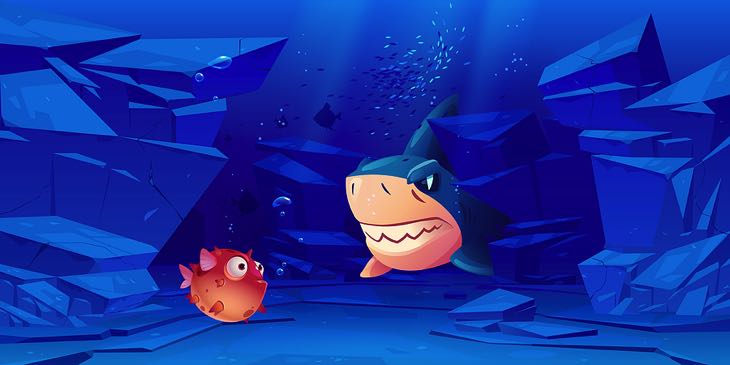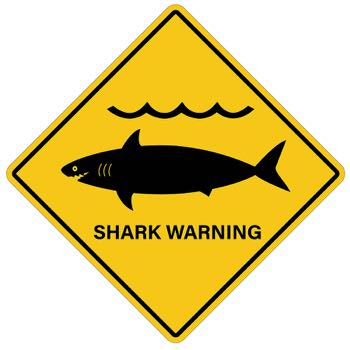 In the world of online poker, the chances are that you are either a shark or a fish. Fish are, generally speaking, relatively inexperienced poker players that aren’t 100% sure what they’re doing, therefore liable to fall prey to those that do. ‘Fish’ is a term given to weaker players on poker sites, with fish tending to be eaten up by the sharks that swim in the same water as them and are representative of the better players of the game.
In the world of online poker, the chances are that you are either a shark or a fish. Fish are, generally speaking, relatively inexperienced poker players that aren’t 100% sure what they’re doing, therefore liable to fall prey to those that do. ‘Fish’ is a term given to weaker players on poker sites, with fish tending to be eaten up by the sharks that swim in the same water as them and are representative of the better players of the game.
The problem that poker sites have encountered is that fish are the ones that typically tend to bring the money. If they are constantly having that money taken off them by better players, then obviously they’re not going to be that keen to return to a site, meaning that companies need to find ways to make the waters friendlier to fish and less inviting to sharks. Extended metaphor aside, here’s how the poker sites are reacting.
What’s a Fish & What’s a Shark?

Before we go any further, it’s important to ensure that we’re all on the same page in terms of the references that we are using. Poker sharks are people that have a firm grasp of the game, including the risks that they’re taking and the ratio of combinations in play during a game. They are able to evaluate their opponents quickly and spot the patterns that they play with and the tells that they have in their game.
Sharks will strategise about the best way to win poker hands. They will happily lose a hand or two if it gives them information about their opponent that lets them win the battle with another player overall. As you might imagine, poker sharks are happy to circle the waters and wait for the perfect time to strike, allowing fish to gather until they can catch them unaware.
Fish, on the other hand, are made up of both beginners and amateur players. Amateurs can think that they have a good grasp of the game because they’ve been playing it for decades in one form or another, but in actual fact they stand no chance when they come up against a shark. Fish will have a tendency to think that poker is about luck over skill, waiting for a good hand to drop their way rather than making their own luck.
Fish will tend to approach hands by using one of three strategies: a small conservative bet that will allow them to stay in a hand to see how it develops; a big call or an all-in because they’ve got a decent hand; a big call or an all-in because they’re bluffing and want to take the pot. They’re the main calls that a fish will make, with only a few variations. If you’re not sure which one you are, then the likelihood is that you’re a fish.
Why Sites Want to Rid Themselves of Sharks
When looking at the description of the different types of players that you’ll find on a poker site, you’d be forgiven for thinking that it is survival of the fittest. If fish don’t take the game seriously enough to think about strategy, different playing styles and making their own luck, is it really the responsibility of the poker site to protect from the sharks that are circling the poker room waters and taking advantage of their naivety?
On the one hand, the answer to that is obviously ‘no’. Poker rooms don’t have a responsibility to protect players and really the law of the jungle should apply, to mix metaphors. However, sharks are skilled players that are on the sites to make money, meaning that they don’t tend to bring much money with them. Fish are the ones that bring the money, given that they lose it and need to replenish their stack regularly.
With poker sites taking a rake from each hand that is played, they need money to be on the table in order to make a gain. If fish are constantly being eaten by sharks then sooner or later they’re going to decide to stop swimming in that particular section of water. This will mean that the poker rooms end up with sharks constantly circling each other but no one looking to strike. Fish are, as you might imagine, the lifeblood of the poker rooms.
As a result, it has become really important for poker sites to find different ways to ensure that the fish will want to keep returning and playing poker with them. Without the fish, their returns drop off, so sharks can’t be allowed to constantly rule the roost, to add another metaphor into the mix. Sites want players to return to them again and again, but in order to ensure that they have to limit the ability of sharks to keep snacking on the fish.
How the Sharks Increase Their Edge
 Ultimately, poker is a card game in which players go up against one another and their fate is dictated by the cards that they’re dealt. Yes, people are able to bluff and attempt to convince others at the table that they’ve got a better hand than they have, but if someone decides to call their bluff or they simply have better cards, no amount of bluster will be able to shift the game in the bluffer’s favour.
Ultimately, poker is a card game in which players go up against one another and their fate is dictated by the cards that they’re dealt. Yes, people are able to bluff and attempt to convince others at the table that they’ve got a better hand than they have, but if someone decides to call their bluff or they simply have better cards, no amount of bluster will be able to shift the game in the bluffer’s favour.
As a result, there are numerous things that sharks do that allow them to increase their own edge and move the odds their way. One of the main ways that sharks do this is by using tracking software, which tracks their online play and analyses their game, as well as offering detailed information on how their opponents are playing. It keeps a record of how players have played, enabled an analyse based over time.
It is the opponent analysis that is the most useful, with the software collecting information on the people that sharks are up against. It will tell them which players to avoid, which to exploit and how to do so. Virtually, every shark in the business will be using tracking software, such is the extent to which the insights provided allow them to move and shape their game to win more often than not.
What Changes Have Been Made
Now we understand what fish are, what sharks are and why it is that poker sites want to make changes to make their figurative waters safer for the fish to swim in, it’s worth exploring the changes that sites are are thinking about making, or have actively begun introducing, to that end. It is only right that fish are given the opportunity to avoid sharks where they can, which will then encourage them to return to the table in the future.
Fast Fold Games
One of the main things that sharks look to do is prey on fish when they find them. They will target them and keep going at them until they have bled them dry, never wanting to give up a good thing. The problem that fish have got is that they might not know that they’re being preyed upon and they almost certainly won’t have a clue about how to move away from a table with a shark on to play somewhere else instead.
That is why fast fold games were invented. Introduced for the first time in 2010, fast fold poker, which can also be called zoom poker, zone poker, snap poker or a number of other varieties on that theme, sees players moved to a new table and a new game the second that they fold their hands in the game they’re playing in. You don’t need to do anything special when playing fast fold poker, simply chucking your cards when you’re done.
At that point, the software of the site that you’re playing poker on will see you moved to a different table with a game that is about to get underway. The beauty of this is that players aren’t on the same table for long enough to allow a shark to feed on their inexperience, instead coming up against new players with every hand dealt. That doesn’t mean that you might not come back around to the same table as each at some point, though.
Sharks will still make notes on the players that they come up against, but it is much more difficult for them to built up any sort of read on players given they won’t play as many hands against them. It is a fast-paced world, as you might expect, so isn’t necessarily a way for less experienced players to gain a good introduction to the online poker world. It’s all about balance, however, and playing in fast fold games allows you to avoid falling prey to a shark on a regular basis.
Anonymous Tables
One of the main ways that a shark can keep track of a fish is by watching how they play and making a judgement call on what their playing style means to their ability. They can do this because poker sites ask players to pick a username, which is then displayed on the table as you’re playing games. In order to stop sharks from being able to keep track of fish, some poker sites now offer anonymous tables, in which no names are displayed.
As a result, sharks find it much more difficult to keep tabs on the fish that they’re trying to exploit. Is the person that has just gone all-in a fish demonstrating their naivety of the game, or a fellow shark who has landed four of a kind Aces? The lack of names will limit their ability to predict who it is they’re going up against and what sort decisions the other poker players tend to make.
As well as removing names from the site, anonymous poker rooms also stop the use of making notes on players. In an anonymous room, notes and tags will expire the second that either the shark or the person that they were playing with decides to leave the table. Add to that the fact that Heads-Up-Displays are banned from the rooms, stopping sharks from seeing data on their opponents, and you can see why anonymous rooms are popular with inexperienced players.
The reality is that anonymous poker rooms have far fewer sharks playing in them than open rooms. Given the fact that there are open rooms online where sharks can track, make notes on and generally exploit fish, why would they waste their time in rooms that actively make life more difficult for them? Even the fish in the anonymous rooms will almost certainly try their hand at an open one sooner or later, so they shark can eat them there instead.
Limited Number of Tables
The truth about weaker players is that they tend to play for low stakes during the early part of their online poker life. Why pay large sums of money to play online poker, which will see you lose your stack relatively quickly as you’re learning the ropes, when you can instead head to rooms where the stakes are low and the play feels much friendlier? In order to make money, therefore, sharks tend to play on several tables at the same time.
In order to stop this from happening and dissuade sharks from bleeding the tables dry of fish, PokerStars decided to introduce a policy on its site that limits the number of tables a person can play on at the same time to four. Prior to that, people could play on as many as 24 tables simultaneously if they wished to. That had a profound impact on the ecology of the poker sites, so PokerStars’ decision made all sorts of sense.
As a result, the sharks mainly decided to swim in another poker site’s waters, meaning that low stakes games were once again claimed by fish. As with the anonymous tables, sharks made a decision that their lives would be much easier if they could play on a site that allowed them to be on numerous tables at the same time, which gave them the chance to increase their margins.
Banned Tools
Whilst proponents of the likes of tracking software and Heads-Up-Displays would argue against them being a way to cheat, there’s no question that they give the users an advantage that those that don’t know how to use such things don’t have. Someone tracking the hands that they’ve played and the ones that you’ve played will have a better idea of how to take advantage of you than those that can’t do as much.
As a result, some poker sites decided to start banning people from using certain tools and services when playing games on their sites. Some tools remained useable, such as those that merely keep a track of pot odds or hand strengths, whilst others were banned entirely. Tools that have been banned include bots playing for you, those that offer real-time advice and any that share hole card information with other players.
It would be untrue to suggest that these changes make a profound affect on a shark’s ability to feed off a fish, but they at least make it more difficult for them to do so automatically. Instead, sharks need to think a little bit more clearly about the players that they’re up against and the decisions that they make. Playing on sites that have been such tools is a sensible decision for those with little-to-no poker experience.
